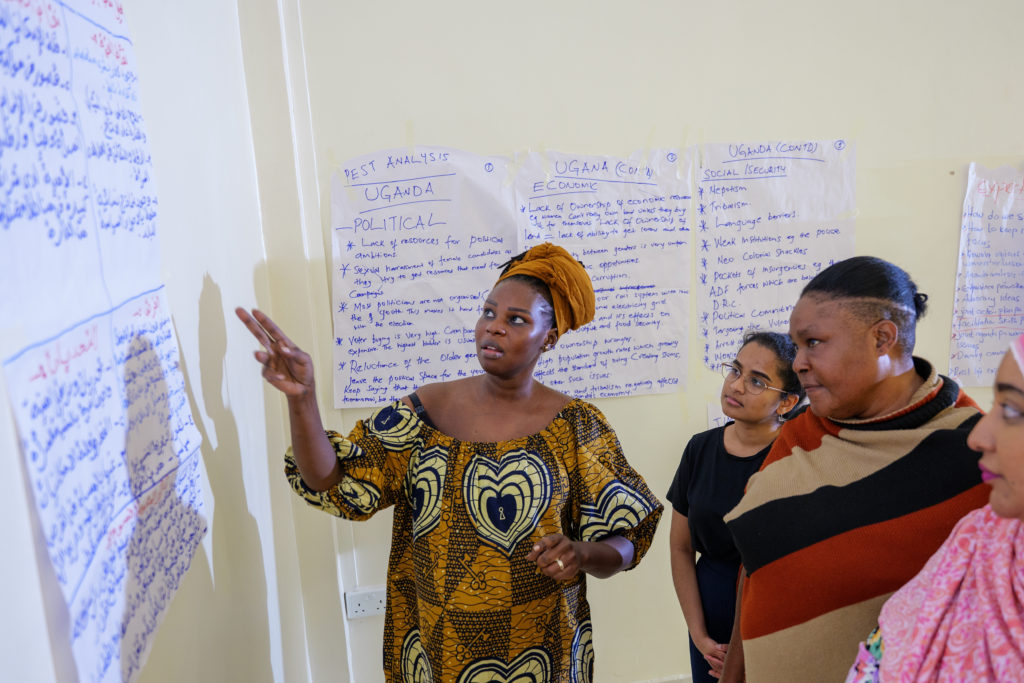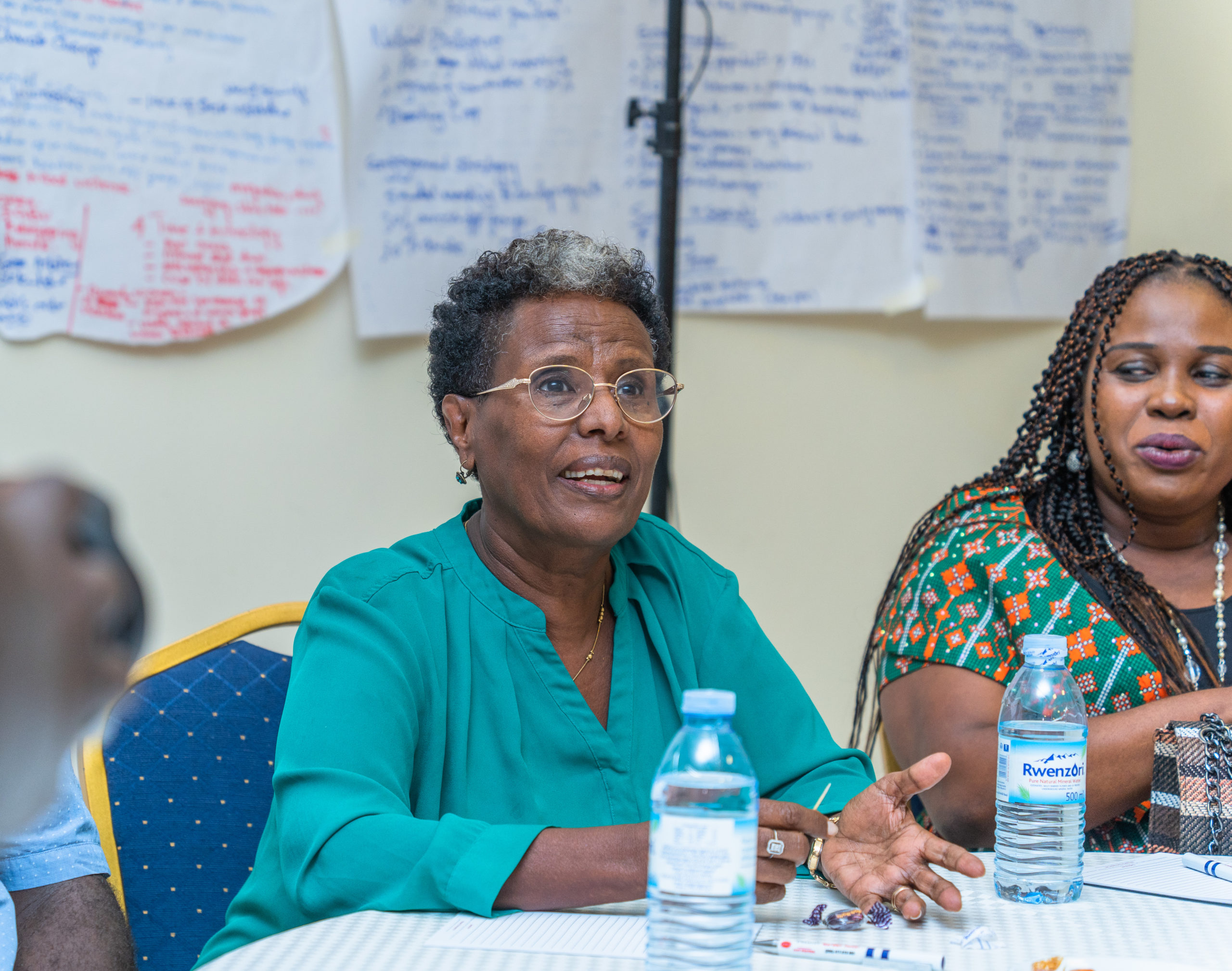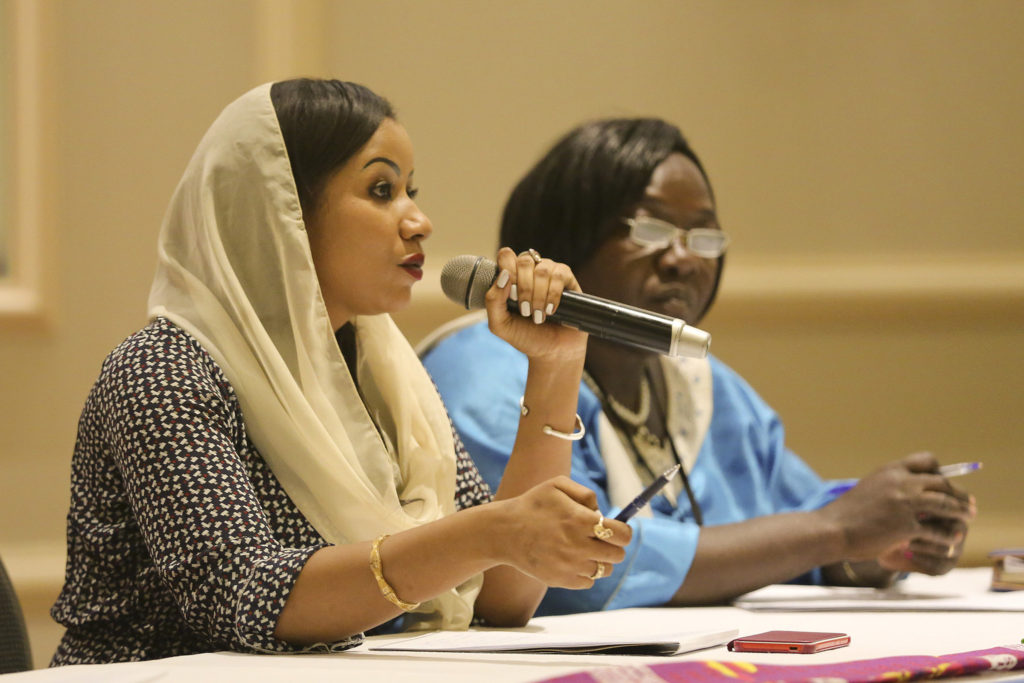Building Women’s Coalitions as a Bridge to Inclusive Dialogue
Patriarchal backlash and increasing levels of armed conflict are currently compounding long-standing challenges to women’s meaningful participation in peacemaking and peacebuilding. In various contexts, building collaboration and coalitions have served as an effective strategy in this regard.
Comparative research shows that advocating for a common agenda can be an effective means for women to make themselves heard during and after peace and political transition processes. Burundi, Colombia, the DRC, Nepal, the Philippines, and Northern Ireland are cases in point.
Women-led coalitions’ primary purpose naturally depends on the specificities of the context women peacebuilders are operating in. A nuanced, context-specific approach is therefore key for making coalition building work.
Women coalitions emerging under conditions of escalating armed conflict usually focus on mitigating the dire consequences of large-scale combat. Sudanese women, for example, formed networks and initiatives following the outbreak of the armed conflict between the SAF and the RSF on 15 April 2023 to advocate for peace talks and women’s inclusion therein; to conduct shuttle diplomacy efforts; provide humanitarian relief; and document human rights violations committed by conflict parties.
In recent consultations organised by Inclusive Peace featuring Sudanese women, forming a coherent women-led anti-war movement that pushes for the pursuit of inclusive peace talks was cited as a key priority. Developing a joint roadmap for women from different Sudanese regions to implement the resolutions from the 2024 Geneva talks emerged as a tangible entry point in this regard.
Armed fighting obviously undermines efforts to connect individual women-led initiatives inside Sudan, while also reinforcing and shaping political and social fragmentation. However, wherever the security situation permits, efforts to strengthen collaboration and coordination among Sudanese women can facilitate their ongoing advocacy and humanitarian relief activities while also giving them a space to plan their involvement in any ongoing or future peacemaking initiative. Any related coalition building effort may also target active women fighters to give women peacemakers and peacebuilders access to the conflict parties.
A coalition building success story: The CWVND in Ethiopia
The Coalition for Women’s Voice in the National Dialogue (CWVND) in Ethiopia shows that coalition building can enhance women’s leverage over ongoing peacemaking initiatives in various ways. Importantly, this also applies to alternative peacemaking spaces like the country’s ongoing National Dialogue process, which is currently proceeding in the absence of a formal peace process.
CWVND, which was established in March 2022, currently encompasses over 50 women-led CSOs from Ethiopia. Its members’ joint commitment to ensuring women’s meaningful participation in Ethiopia’s national dialogue at the national level more broadly is the glue that holds the coalition together.
Two of CWVND’s activities are worthy of particularly close attention.
First, in 2023, the coalition planned and implemented consultations with more than 3,000 women from eight subnational regions and two city administrations. CWVND and TIMRAN (ትምራን), which serves as the coalition’s secretariat, subsequently condensed women’s priorities, concerns, and demands into a succinct 10-point women’s agenda, which they shared with the Ethiopian National Dialogue Commission (ENDC).
Second, CWVND and TIMRAN trained 151 women as consultation facilitators. The ENDC subsequently deployed 28 of those trained women facilitators for the regional agenda consultations under the national dialogue process.
Three key lessons emerge from the CWVND’s work regarding coalition building and its capacity to promote women’s participation in alternative peacemaking spaces like National Dialogues:
➜ Be quick: CWVND started preparing agenda setting women’s consultations soon after the ENDC officially started operating in February 2022. This short reaction period allowed CWVND to be ahead of the curve in the national dialogue process and increase its visibility during the agenda setting phase.
➜ Maximise local ownership: CWVND had significant agency throughout the agenda consolidation process. Ethiopian women hence own the resulting agenda, which provides them with a strong foundation for advocating for a transformation of women’s position in Ethiopia’s society during the national dialogue and beyond.
➜ Support women with diversifying their participation modalities in peacemaking spaces: Women-led coalitions can support women with entering and influencing peacemaking spaces in different functions. The ENDC’s decision to draw on 28 CWVND-trained women facilitators indicates that CWVND’s training interventions have strengthened women’s reputation as stakeholders with relevant thematic knowledge, skills, and expertise regarding the national dialogue. Their formal involvement as facilitators and technical experts allows women to shape the national dialogue process in various roles.

Coalition building: Challenges and implications for external supporters
Building coalitions among women comes with multi-faceted challenges. Four issues stand out. First, women are a heterogeneous group. They often pursue different political agendas and disagree on the priorities and ideal outcomes of a peace or political transition process, particularly in more polarised environments. In Nepal, for example, women representatives in the first Constituent Assembly focused on advancing the position of their respective political party rather than women’s rights.
Second, women peacemakers and peacebuilders operating in conflict-affected and more markedly patriarchal contexts often encounter severe threats and backlash in the physical and digital space. Abduction, arbitrary arrests, rape, defamation, slander, smear campaigns, and intimidation make coalition building a dangerous undertaking. Managing and mitigating those risks is therefore a key pillar of any impactful coalition building effort.
Third, women-led coalitions may only enable women’s meaningful participation if they can grow organically and make independent decisions about which activities they want to pursue. The case of the women-led civil society organisation Ugaaso in Ethiopia’s Somali region shows that strong and vocal women coalitions take time to evolve, yet can make a significant impact along the way.
Fourth, women often lack information and awareness of other ongoing women-led peacemaking initiatives, which can constrain their collaboration and coordination. In Yemen, for example, women often receive information about ongoing mediation initiatives very late in the day, if at all, which significantly constrains their efforts to collectively strategise and influence those processes.
The next iteration of this series on participation will draw on Ethiopian women’s recent coalition building experiences to highlight lessons learned regarding the practicalities of addressing some of those challenges and establishing and maintaining a women-led coalition.
In the meantime, several entry points exist for the international community to enhance women’s coalition building efforts. For example, skilful external facilitation and technical as well as financial accompaniment can help women to develop trustful relationships with each other through repeated exchanges.
External actors’ commitment to serving as a long-term companion can also bolster a women’s coalition’s development. The same holds for local ownership. As indicated above, providing on-demand, subtle support from behind the scenes allows external actors to maximise women’s agency in any coalition building initiative.
Philip Poppelreuter | Researcher, Inclusive Peace
This blog is part of Inclusive Peace’s 2025 series on women’s effective participation in peace processes. The series examines context-sensitive strategies women have successfully pursued or could pursue to shape peacemaking and peacebuilding in a changing geopolitical context marked by increasing levels of armed conflict, greater multipolarity – both in general and more specifically in terms of mediation actors – and a decline in comprehensive peace processes and agreements led by the UN. It is based on comparative findings of a project Inclusive Peace is undertaking in partnership with the Irish DFA in the run-up to the 25th anniversary of UNSCR 1325 in October 2025.


